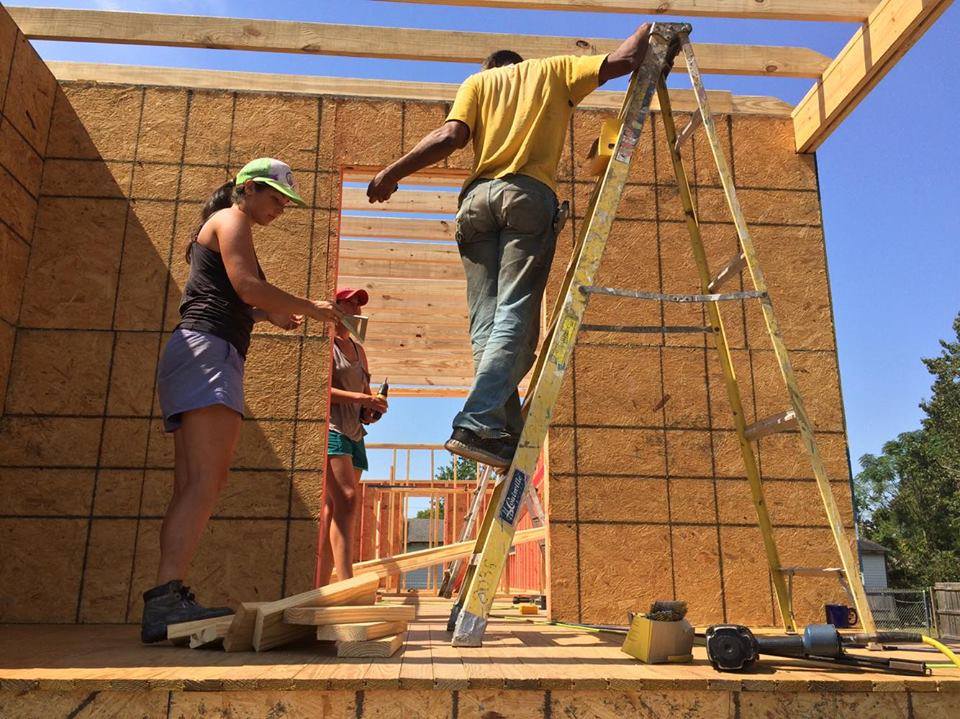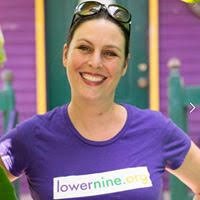
Note to the reader: this interview has been edited for length and clarity.
“The story that I’ve been trying to put people on, for years now, is that as we face this long, long, long term recovery here, there’s a lot of talk about focusing on the future, and not wallowing in the past, and resilience (which is a word I’m not crazy about), and there’s a lot of unwillingness to talk about what is to my mind, the larger issue—which is that prior to Katrina, the Lower Ninth Ward had one of the highest rates of homeownership in the country.
“And there was a program put in place, designed to help Louisiana homeowners get back into their properties. That program was found to be discriminatory. Unfortunately, that hasn’t gone anywhere toward making people here whole. Or returning their property to them.”
 So begins Laura Paul, the Executive Director of Lowernine.org, a rebuilding organization that works exclusively with homeowners in the Lower Ninth Ward. Outspoken and tall, Paul speaks quickly and loudly, whether she is hosting the dozens of people who come for her monthly community barbeques at her Lower Ninth Ward home, or talking to a reporter while simultaneously organizing a hunt for an errant load of Hardie board yet to be delivered.
So begins Laura Paul, the Executive Director of Lowernine.org, a rebuilding organization that works exclusively with homeowners in the Lower Ninth Ward. Outspoken and tall, Paul speaks quickly and loudly, whether she is hosting the dozens of people who come for her monthly community barbeques at her Lower Ninth Ward home, or talking to a reporter while simultaneously organizing a hunt for an errant load of Hardie board yet to be delivered.
The programs she refers to are Road Home — a program that offered funds to rebuild or buy out property based on the pre-storm estimated value of the home (so that your estimated cost to repair was indexed to the wealth in your neighborhood, an example of modern racist housing policy) — and the New Orleans Redevelopment Authority, which manages the thousands properties from homeowners who took proffered buyout money from Road Home, following Hurricane Katrina.
I met with Paul on a sun-drenched morning in lowernine.org’s operation base, a small home which also serves as volunteer housing for the full-time crews who sleep on tall bunk beds in the back rooms. Tucked onto EL Dorado Street in the Lower Ninth Ward, the house is that eclectic mix of New Orleans markers mixed with that of a non-profit—an aerial map showing density of SNAP recipient households by block in the Lower Ninth Ward, bowls of bananas and bags of bread in the kitchen for volunteers, lacy-leaved banana trees in the yard, the porch screened by strings of greying Mardi Gras Beads and the eponymous logo painted on a shed in front of the house, in gold, green, and purple.
Paul and I discussed and the unique challenges faced by the Lower Ninth Ward, as well as what the non-profit rebuilding landscape looks like today. Project Homecoming, one housing and rebuilding organization, ceased to exist in 2017, while another, Rebuilding Together New Orleans, is still active but has a far smaller field crew than in the initial days of hurricane recovery.
Paul’s organization works with homeowners who have retained their property in the Lower Ninth Ward but need assistance rebuilding. She has seen firsthand how many of the pre-Katrina households—nearly all Black, many of whom owned their homes outright—were unable to keep their homes.
Households that once owned their house without having to pay a mortgage were, therefore, able to live with low wages, while those same families may now face steep rents and other mounting bills in a state with the lowest possible minimum wage in the US.
LP: What happened was that a lot of Lower Ninth ward homeowners lost their properties because of that program [Road Home]. And those properties are now in the hands of a self-described quasi-governmental agency.
JLB: NORA [New Orleans Redevelopment Authority]?
LP: Yeah. And that agency is disseminating property however they see fit, but what they don’t see fit to do, and this is one of the issues that I have with them, is reach out to people who were victims of this federally funded program… and find out what they want and need.
It’s obvious that if you have a safe home environment, and you have the financial stability that comes with the security in that area, your mental health is gonna be better, your children are gonna feel safer. Your cost of living is gonna be lower, and your standard of living is gonna be higher…
You know rent went up… and over the last few years, it’s gone up more and more. For want of a better word, it’s gentrification, although when you talk about gentrification in this neighborhood, you need to be aware that when 100 percent of a neighborhood is rendered homeless overnight, and 10-15 years later, the population looks different, that’s not really gentrification. You need a bigger, better word. You need to put it in all caps.
And when you look at a government program[Road Home], it’s a government system that seems almost designed to prevent people from returning to their homes—I know that sounds a little conspiracy theorist-y, I’m talking about Road Home, and the follow-up program, the New Orleans Redevelopment Authority (NORA).
Paul praised the Lot-Next Door program, which allows homeowners “first dibs” to buy lots owned by NORA if it is—you guessed it—the lot next door, but says that it’s “insulting” that residents have not gotten cheaper prices for the land. Meanwhile, she complains that NORA will sell lots to non-profits for extremely low prices.
Paul also discussed at length the issue of non-profits building homes to be designated Section 8 housing, where low-income renters pay a set portion of their income while the rest is subsidized. Though Paul characterizes the program as extremely positive, she notes that renters in that situation are not able to build equity and pass on wealth to their children, as homeowners can.
LP: When you talk about an investment [in property] you start talking about getting government subsidies, using volunteer labor, donated materials, getting tax dollars to supplement rent—if you start number-crunching, there’s real money to be made. And I don’t think that’s the goal of non-profit organizations. And I don’t think that should be the goal of the New Orleans Redevelopment Authority… I think they should be looking at where this property came from, and how to return it.
Against the backdrop of ongoing recovery, Lowernine.org has completed repairs on 87 homes in the neighborhood and completed small projects in over 200 other homes. Homeowners usually find out about the organization by word of mouth, and contribute some money towards the cost of materials, though the labor provided by volunteers, staff, and skilled workers (such as electricians) is of no cost to the homeowner. This makes the renovations drastically cheaper than working with a contractor.
Though seemingly myopic in focus, working exclusively in one neighborhood for well over a decade has meant that the organization has become familiar in the neighborhood, and more aware of community needs.
LP: We’re a small organization, and it makes sense for us to focus in a small area, it makes things easier logistically. But I don’t really see the need in the way I do here, anywhere else.
JLB: Have you seen interest in coming to rebuild going down, or coming back up?
LP: We have to explain ourselves a lot. It’s kind of a tough sell, to say ‘we’re still not back on our feet.’ But it comes a lot easier when people get here and get their feet on the ground in the neighborhood and drive around. It’s getting them here.
I’ve always said, and I’ll say it again (though it offends people from Nebraska) We’re lucky we’re not in Nebraska! At least people want to come to New Orleans anyway.
JLB: How do you make sure that Black New Orleanians are heard, and represented at your organization?
LP: They represent almost all of our clients, so by definition, they’re being represented—they’re our clients so we’re taking care of their best interests when it comes to their housing situation. We’re not an advocacy group, we don’t take on the kind of work—I sit on the neighborhood association of Holy Cross, and I participate in the kinds of discussions that are lower Ninth ward focused—but we, as an organization don’t get involved in policy conversations, voter registration or anything like that. We all live here, I live a couple of blocks away.
JLB: What keeps you going, working in this neighborhood for so long?
LP: I don’t know. (Laughs) A lot of people have given up and gone home. A lot of work is done, to be fair, and I think a lot of people have done a lot of good. We’re just not done yet. I guess maybe I’m just stubborn, or maybe just don’t see the light at the end of the tunnel yet. I don’t think we can just pass the baton. I don’t see a lot of interest in doing the kind of work that we’re doing for the people we’re doing it for, there’s no money in it, there’s no glory in it. It gets me out of bed in the morning, but I don’t know… we have forward momentum. We have a system that works, we have people that care… that’s a reason to get up in the morning.
Jesse Lu Baum is a queer writer and cartoonist originally from Brooklyn, New York. Her writing has been featured in publications such as Medium.com, The Jewish Daily Forward, The Mid-City Messenger and Preservation in Print. Aside from writing, she has also worked as a non-profit home repair person, a theater bartender, and a research assistant.









